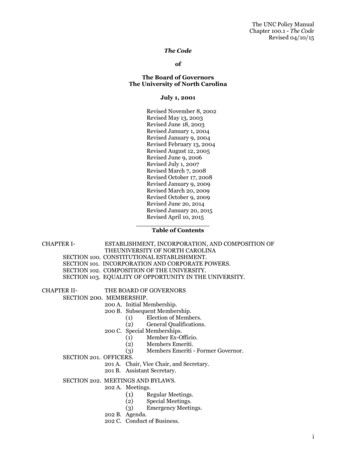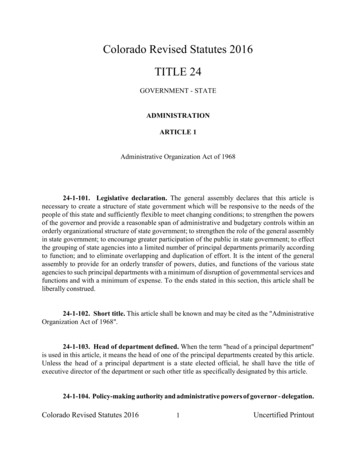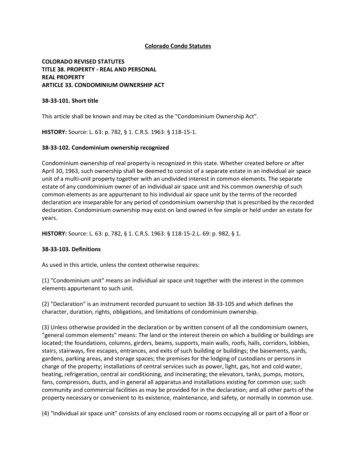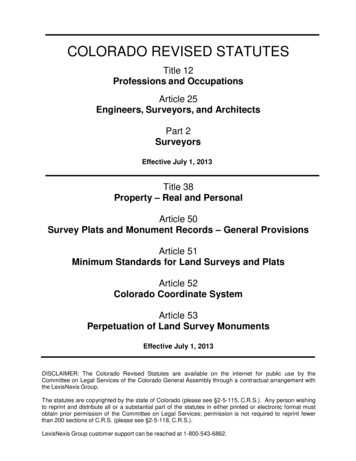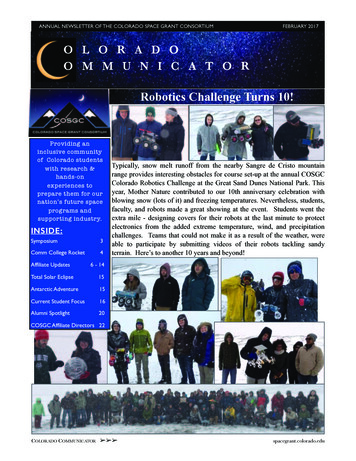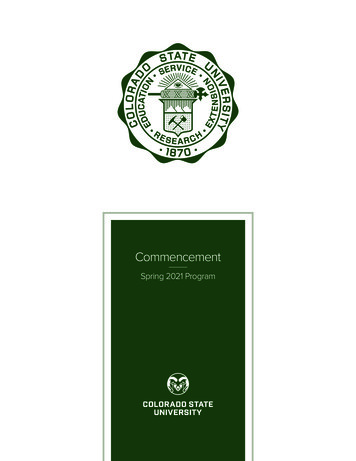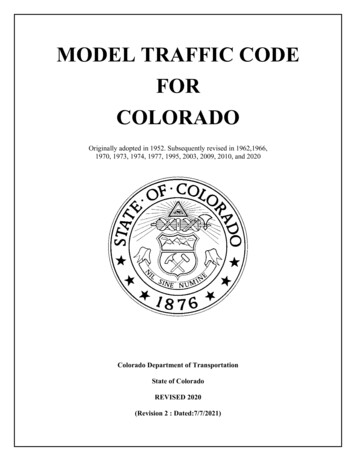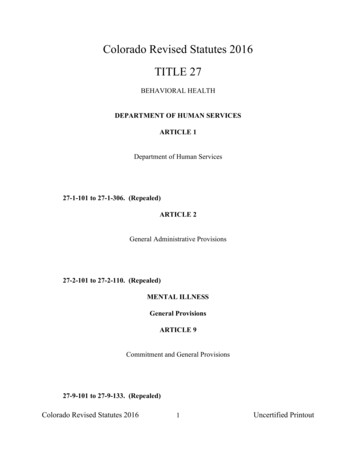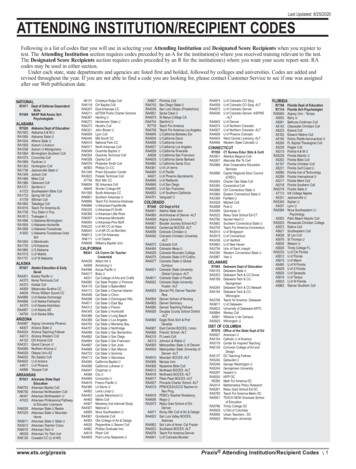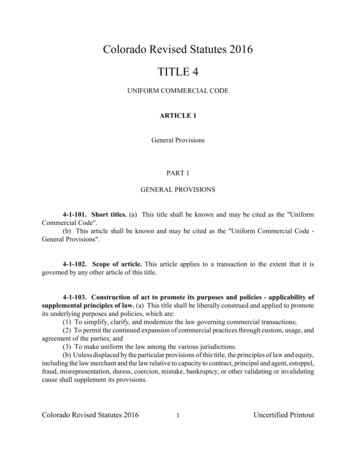
Transcription
Colorado Revised Statutes 2016TITLE 4UNIFORM COMMERCIAL CODEARTICLE 1General ProvisionsPART 1GENERAL PROVISIONS4-1-101. Short titles. (a) This title shall be known and may be cited as the "UniformCommercial Code".(b) This article shall be known and may be cited as the "Uniform Commercial Code General Provisions".4-1-102. Scope of article. This article applies to a transaction to the extent that it isgoverned by any other article of this title.4-1-103. Construction of act to promote its purposes and policies - applicability ofsupplemental principles of law. (a) This title shall be liberally construed and applied to promoteits underlying purposes and policies, which are:(1) To simplify, clarify, and modernize the law governing commercial transactions;(2) To permit the continued expansion of commercial practices through custom, usage, andagreement of the parties; and(3) To make uniform the law among the various jurisdictions.(b) Unless displaced by the particular provisions of this title, the principles of law and equity,including the law merchant and the law relative to capacity to contract, principal and agent, estoppel,fraud, misrepresentation, duress, coercion, mistake, bankruptcy, or other validating or invalidatingcause shall supplement its provisions.Colorado Revised Statutes 20161Uncertified Printout
4-1-104. Construction against implied repeal. This title being a general act intended asa unified coverage of its subject matter, no part of it shall be deemed to be impliedly repealed bysubsequent legislation if such construction can reasonably be avoided.4-1-105. Severability. If any provision or clause of this title or application thereof to anyperson or circumstances is held invalid, such invalidity does not affect other provisions orapplications of this title that can be given effect without the invalid provision or application, and tothis end the provisions of this title are declared to be severable.4-1-106. Use of singular and plural - gender. In this title, unless the statutory contextotherwise requires:(1) Words in the singular number include the plural, and those in the plural include thesingular; and(2) Words of any gender also refer to any other gender.4-1-107. Captions. Section captions are part of this title.PART 2GENERAL DEFINITIONS AND PRINCIPLESOF INTERPRETATION4-1-201. General definitions. (a) Unless the context otherwise requires, words or phrasesdefined in this section, or in the additional definitions contained in other articles of this title thatapply to particular articles or parts thereof, have the meanings stated.(b) Subject to definitions contained in other articles of this title that apply to particulararticles or parts thereof:(1) "Action", in the sense of a judicial proceeding, includes recoupment, counterclaim, setoff, suit in equity, and any other proceeding in which rights are determined.(2) "Aggrieved party" means a party entitled to pursue a remedy.(3) "Agreement" means the bargain of the parties in fact, as found in their language orinferred from other circumstances, including course of performance, course of dealing, or usage oftrade as provided in section 4-1-303. (Compare "contract".)(3.5) "Authenticate" means:(A) To sign; or(B) With the intent to sign a record, otherwise to execute or adopt an electronic symbol,sound, message, or process referring to, attached to, included in, or logically associated or linkedwith, that record.(4) "Bank" means a person engaged in the business of banking and includes a savings bank,Colorado Revised Statutes 20162Uncertified Printout
savings and loan association, credit union, and trust company.(5) "Bearer" means a person in control of a negotiable electronic document of title or aperson in possession of a negotiable instrument, negotiable tangible document of title, or certificatedsecurity that is payable to bearer or indorsed in blank.(6) "Bill of lading" means a document of title evidencing the receipt of goods for shipmentissued by a person engaged in the business of directly or indirectly transporting or forwarding goods.The term does not include a warehouse receipt.(7) "Branch" includes a separately incorporated foreign branch of a bank.(8) "Burden of establishing" a fact means the burden of persuading the trier of fact that theexistence of the fact is more probable than its nonexistence.(9) "Buyer in ordinary course of business" means a person that buys goods in good faith,without knowledge that the sale violates the rights of another person in the goods, and in the ordinarycourse from a person, other than a pawnbroker, in the business of selling goods of that kind. Aperson buys goods in the ordinary course if the sale to the person comports with the usual orcustomary practices in the kind of business in which the seller is engaged or with the seller's ownusual or customary practices. A person that sells oil, gas, or other minerals at the wellhead orminehead is a person in the business of selling goods of that kind. A buyer in ordinary course ofbusiness may buy for cash, by exchange of other property, or on secured or unsecured credit, andmay acquire goods or documents of title under a preexisting contract for sale. Only a buyer that takespossession of the goods or has a right to recover the goods from the seller under article 2 of this titlemay be a buyer in ordinary course of business. A person that acquires goods in a transfer in bulk oras security for or in total or partial satisfaction of a money debt is not a buyer in ordinary course ofbusiness.(10) "Conspicuous", with reference to a term, means so written, displayed, or presented thata reasonable person against which it is to operate ought to have noticed it. Whether a term is"conspicuous" or not is a decision for the court. Conspicuous terms include the following:(A) A heading in capital letters equal to or greater in size than the surrounding text, or incontrasting type, font, or color to the surrounding text of the same or lesser size; and(B) Language in the body of a record or display in larger type than the surrounding text, orin contrasting type, font, or color to the surrounding text of the same size, or set off from surroundingtext of the same size by symbols or other marks that call attention to the language.(10.5) "Consumer" means an individual who enters into a transaction primarily for personal,family, or household purposes.(11) "Contract" means the total legal obligation that results from the parties' agreement asdetermined by this title as supplemented by any other applicable laws. (Compare "agreement".)(12) "Creditor" includes a general creditor, a secured creditor, a lien creditor, and anyrepresentative of creditors, including an assignee for the benefit of creditors, a trustee in bankruptcy,a receiver in equity, and an executor or administrator of an insolvent debtor's or assignor's estate.(13) "Defendant" includes a person in the position of defendant in a counterclaim or thirdparty claim.(14) "Delivery", with respect to an electronic document of title, means voluntary transfer ofcontrol and with respect to an instrument, a tangible document of title, or chattel paper, meansColorado Revised Statutes 20163Uncertified Printout
voluntary transfer of possession.(15) "Document of title" means a record (i) that in the regular course of business or financingis treated as adequately evidencing that the person in possession or control of the record is entitledto receive, control, hold, and dispose of the record and the goods the record covers and (ii) thatpurports to be issued by or addressed to a bailee and to cover goods in the bailee's possession whichare either identified or are fungible portions of an identified mass. The term includes a bill of lading,transport document, dock warrant, dock receipt, warehouse receipt, and order for delivery of goods.An electronic document of title means a document of title evidenced by a record consisting ofinformation stored in an electronic medium. A tangible document of title means a document of titleevidenced by a record consisting of information that is inscribed on a tangible medium.(16) "Fault" means a wrongful act, omission, breach, or default.(17) "Fungible goods" means either:(A) Goods of which any unit, by nature or usage of trade, is the equivalent of any other likeunit; or(B) Goods that by agreement are treated as equivalent.(18) "Genuine" means free of forgery or counterfeiting.(19) "Good faith", except as provided in article 5 of this title, means honesty in fact and theobservance of reasonable commercial standards of fair dealing.(20) "Holder" means:(A) The person in possession of a negotiable instrument that is payable either to bearer orto an identified person that is the person in possession;(B) The person in possession of a negotiable tangible document of title if the goods aredeliverable either to bearer or to the order of the person in possession; or(C) The person in control of a negotiable electronic document of title.(21) "Insolvency proceeding" includes an assignment for the benefit of creditors or otherproceeding intended to liquidate or rehabilitate the estate of the person involved.(22) An "insolvent" person is a person that:(A) Has generally ceased to pay debts in the ordinary course of business other than as a resultof a bona fide dispute as to the debts;(B) Is unable to pay debts as they become due; or(C) Is insolvent within the meaning of federal bankruptcy law.(23) "Money" means a medium of exchange currently authorized or adopted by a domesticor foreign government. The term includes a monetary unit of account established by anintergovernmental organization or by agreement between two or more countries.(24) "Organization" means a person other than an individual.(25) "Party", as distinct from a "third party", means a person that has engaged in atransaction or made an agreement subject to this title.(26) "Person" means an individual, corporation, business trust, estate, trust, partnership,limited liability company, association, joint venture, government, government subdivision, agency,or instrumentality, or any other legal or commercial entity.(27) "Present value" means the amount as of a date certain of one or more sums payable inthe future, discounted to the date certain by use of either an interest rate specified by the parties ifthat rate is not manifestly unreasonable at the time the transaction is entered into or, if an interest rateColorado Revised Statutes 20164Uncertified Printout
is not so specified, a commercially reasonable rate that takes into account the facts and circumstancesat the time the transaction is entered into.(28) "Presumption" or "presumed" means that the trier of fact must find the existence of thefact presumed unless and until evidence is introduced that would support a finding of itsnonexistence.(29) "Purchase" means taking by sale, lease, discount, negotiation, mortgage, pledge, lien,security interest, issue or reissue, gift, or any other voluntary transaction creating an interest inproperty.(30) "Purchaser" means a person that takes by purchase.(31) "Record" means information that is inscribed on a tangible medium or that is stored inan electronic or other medium and is retrievable in perceivable form.(32) "Remedy" means any remedial right to which an aggrieved party is entitled, with orwithout resort to a tribunal.(33) "Representative" means any person empowered to act for another, including an agent,an officer of a corporation or association, and a trustee, executor, or administrator of an estate.(34) "Right" includes remedy.(35) "Security interest" means an interest in personal property or fixtures that securespayment or performance of an obligation. The term also includes any interest of a consignor and abuyer of accounts, chattel paper, a payment intangible, or a promissory note in a transaction that issubject to article 9 of this title. The special property interest of a buyer of goods on identification ofthose goods to a contract for sale under section 4-2-401 is not a "security interest", but a buyer mayalso acquire a "security interest" by complying with article 9 of this title. Except as otherwiseprovided in section 4-2-505, the right of a seller or lessor of goods under article 2 or 2.5 of this titleto retain or acquire possession of the goods is not a "security interest", but a seller or lessor may alsoacquire a "security interest" by complying with article 9 of this title. The retention or reservation oftitle by a seller of goods notwithstanding shipment or delivery to the buyer (section 4-2-401) islimited in effect to a reservation of a "security interest". Whether a transaction in the form of a leasecreates a "security interest" is determined pursuant to section 4-1-203.(36) "Send", in connection with a writing, record, or notice, means to:(A) Deposit in the mail or deliver for transmission by any other usual means ofcommunication with postage or cost of transmission provided for and properly addressed and, in thecase of an instrument, to an address specified thereon or otherwise agreed, or, if there is none, to anyaddress reasonable under the circumstances; or(B) In any other way cause to be received any record or notice within the time it would havearrived if properly sent.(37) "Signed" includes any symbol executed or adopted with present intention to adopt oraccept a writing.(38) "State" means a state of the United States, the District of Columbia, Puerto Rico, theUnited States Virgin Islands, or any territory or insular possession subject to the jurisdiction of theUnited States.(39) "Surety" includes a guarantor or other secondary obligor.(40) "Term" means a portion of an agreement that relates to a particular matter.(41) "Unauthorized signature" means a signature made without actual, implied, or apparentColorado Revised Statutes 20165Uncertified Printout
authority. The term includes a forgery.(42) "Warehouse receipt" means a document of title issued by a person engaged in thebusiness of storing goods for hire.(43) "Writing" includes printing, typewriting, or any other intentional reduction to tangibleform. "Written" has a corresponding meaning.4-1-202. Notice - knowledge. (a) Subject to subsection (f) of this section, a person has"notice" of a fact if the person:(1) Has actual knowledge of it;(2) Has received a notice or notification of it; or(3) From all the facts and circumstances known to the person at the time in question, hasreason to know that it exists.(b) "Knowledge" means actual knowledge.(c) "Discover", "learn", or words of similar import refer to knowledge rather than to notice.(d) A person "notifies" or "gives" a notice or notification to another by taking such steps asmay be reasonably required to inform the other in ordinary course, whether or not the other personactually comes to know of it.(e) Subject to subsection (f) of this section, a person "receives" a notice or notification when:(1) It comes to that person's attention; or(2) It is duly delivered in a form reasonable under the circumstances at the place of businessthrough which the contract was made or at another location held out by that person as the place forreceipt of such communications.(f) Notice, knowledge, or a notice or notification received by an organization is effective fora particular transaction from the time it is brought to the attention of the individual conducting thattransaction and, in any event, from the time it would have been brought to the individual's attentionif the organization had exercised due diligence. An organization exercises due diligence if itmaintains reasonable routines for communicating significant information to the person conductingthe transaction and there is reasonable compliance with the routines. Due diligence does not requirean individual acting for the organization to communicate information unless the communication ispart of the individual's regular duties or the individual has reason to know of the transaction and thatthe transaction would be materially affected by the information.4-1-203. Lease distinguished from security interest. (a) Whether a transaction in the formof a lease creates a lease or security interest is determined by the facts of each case.(b) A transaction in the form of a lease creates a security interest if the consideration that thelessee is to pay the lessor for the right to possession and use of the goods is an obligation for the termof the lease and is not subject to termination by the lessee, and:(1) The original term of the lease is equal to or greater than the remaining economic life ofthe goods;(2) The lessee is bound to renew the lease for the remaining economic life of the goods oris bound to become the owner of the goods;Colorado Revised Statutes 20166Uncertified Printout
(3) The lessee has an option to renew the lease for the remaining economic life of the goodsfor no additional consideration or for nominal additional consideration upon compliance with thelease agreement; or(4) The lessee has an option to become the owner of the goods for no additionalconsideration or for nominal additional consideration upon compliance with the lease agreement.(c) A transaction in the form of a lease does not create a security interest merely because:(1) The present value of the consideration the lessee is obligated to pay the lessor for theright to possession and use of the goods is substantially equal to or is greater than the fair marketvalue of the goods at the time the lease is entered into;(2) The lessee assumes risk of loss of the goods;(3) The lessee agrees to pay taxes, insurance, filing, recording, or registration fees, or serviceor maintenance costs, with respect to the goods;(4) The lessee has an option to renew the lease or to become the owner of the goods;(5) The lessee has an option to renew the lease for a fixed rent that is equal to or greater thanthe reasonably predictable fair market rent for the use of the goods for the term of the renewal at thetime the option is to be performed; or(6) The lessee has an option to become the owner of the goods for a fixed price that is equalto or greater than the reasonably predictable fair market value of the goods at the time the option isto be performed.(d) Additional consideration is nominal if it is less than the lessee's reasonably predictablecost of performing under the lease agreement if the option is not exercised. Additional considerationis not nominal if:(1) When the option to renew the lease is granted to the lessee, the rent is stated to be the fairmarket rent for the use of the goods for the term of the renewal determined at the time the option isto be performed; or(2) When the option to become the owner of the goods is granted to the lessee, the price isstated to be the fair market value of the goods determined at the time the option is to be performed.(e) The "remaining economic life of the goods" and "reasonably predictable" fair marketrent, fair market value, or cost of performing under the lease agreement shall be determined withreference to the facts and circumstances at the time the transaction is entered into.4-1-204. Value. Except as otherwise provided in articles 3, 4, and 5 of this title, a persongives value for rights if the person acquires them:(1) In return for a binding commitment to extend credit or for the extension of immediatelyavailable credit, whether or not drawn upon and whether or not a charge-back is provided for in theevent of difficulties in collection;(2) As security for, or in total or partial satisfaction of, a preexisting claim;(3) By accepting delivery under a preexisting contract for purchase; or(4) In return for any consideration sufficient to support a simple contract.4-1-205. Reasonable time - seasonableness. (a) Whether a time for taking an actionColorado Revised Statutes 20167Uncertified Printout
required by this title is reasonable depends on the nature, purpose, and circumstances of the action.(b) An action is taken seasonably if it is taken at or within the time agreed or, if no time isagreed, at or within a reasonable time.PART 3TERRITORIAL APPLICABILITYAND GENERAL RULES4-1-301. Territorial applicability - parties' power to choose applicable law. (a) Exceptas otherwise provided in this section, when a transaction bears a reasonable relation to this state andalso to another state or nation the parties may agree that the law either of this state or of such otherstate or nation shall govern their rights and duties.(b) In the absence of an agreement effective under subsection (a) of this section, and exceptas provided in subsection (c) of this section, the "Uniform Commercial Code" applies to transactionsbearing an appropriate relation to this state.(c) If one of the following provisions of the "Uniform Commercial Code" specifies theapplicable law, that provision governs and a contrary agreement is effective only to the extentpermitted by the law so specified:(1) Section 4-2-402;(2) Sections 4-2.5-105 and 4-2.5-106;(3) Section 4-4-102;(4) Section 4-4.5-507;(5) Section 4-5-116;(6) (Reserved)(7) Section 4-8-110;(8) Sections 4-9-301 to 4-9-307.4-1-302. Variation by agreement. (a) Except as otherwise provided in subsection (b) ofthis section or elsewhere in this title, the effect of provisions of this title may be varied by agreement.(b) The obligations of good faith, diligence, reasonableness, and care prescribed by this titlemay not be disclaimed by agreement. The parties, by agreement, may determine the standards bywhich the performance of those obligations is to be measured if those standards are not manifestlyunreasonable. Whenever this title requires any action to be taken within a reasonable time, any timethat is not manifestly unreasonable may be fixed by agreement.(c) The presence in certain provisions of this title of the phrase "unless otherwise agreed",or words of similar import, does not imply that the effect of other provisions may not be varied byagreement under this section.4-1-303. Course of performance, course of dealing, and usage of trade. (a) A "courseColorado Revised Statutes 20168Uncertified Printout
of performance" is a sequence of conduct between the parties to a particular transaction that existsif:(1) The agreement of the parties with respect to the transaction involves repeated occasionsfor performance by a party; and(2) The other party, with knowledge of the nature of the performance and opportunity forobjection to it, accepts the performance or acquiesces in it without objection.(b) A "course of dealing" is a sequence of conduct concerning previous transactions betweenthe parties to a particular transaction that is fairly to be regarded as establishing a common basis ofunderstanding for interpreting their expressions and other conduct.(c) A "usage of trade" is any practice or method of dealing having such regularity ofobservance in a place, vocation, or trade as to justify an expectation that it will be observed withrespect to the transaction in question. The existence and scope of such a usage are to be proved asfacts. If it is established that such a usage is embodied in a trade code or similar record, theinterpretation of the record is a question of law.(d) A course of performance or course of dealing between the parties, or usage of trade inthe vocation or trade in which they are engaged or of which they are or should be aware, is relevantin ascertaining the meaning of the parties' agreement, may give particular meaning to specific termsof the agreement, and may supplement or qualify the terms of the agreement. A usage of tradeapplicable in the place in which part of the performance under the agreement is to occur may be soutilized as to that part of the performance.(e) Except as otherwise provided in subsection (f) of this section, the express terms of anagreement and any applicable course of performance, course of dealing, or usage of trade shall beconstrued whenever reasonable as consistent with each other. If such a construction is unreasonable:(1) Express terms prevail over course of performance, course of dealing, and usage of trade;(2) Course of performance prevails over course of dealing and usage of trade; and(3) Course of dealing prevails over usage of trade.(f) Subject to section 4-2-209, a course of performance is relevant to show a waiver ormodification of any term inconsistent with the course of performance.(g) Evidence of a relevant usage of trade offered by one party is not admissible unless thatparty has given the other party notice that the court finds sufficient to prevent unfair surprise to theother party.4-1-304. Obligation of good faith. Every contract or duty within this title imposes anobligation of good faith in its performance and enforcement.4-1-305. Remedies to be liberally administered. (a) The remedies provided by this titlemust be liberally administered to the end that the aggrieved party may be put in as good a positionas if the other party had fully performed but neither consequential or special damages nor penaldamages may be had except as specifically provided in this title or by other rule of law.(b) Any right or obligation declared by this title is enforceable by action unless the provisionColorado Revised Statutes 20169Uncertified Printout
declaring it specifies a different and limited effect.4-1-306. Waiver or renunciation of claim or right after breach. A claim or right arisingout of an alleged breach may be discharged in whole or in part without consideration by agreementof the aggrieved party in an authenticated record.4-1-307. Prima facie evidence by third-party documents. A document in due formpurporting to be a bill of lading, policy or certificate of insurance, official weigher's or inspector'scertificate, consular invoice, or any other document authorized or required by the contract to beissued by a third party shall be prima facie evidence of its own authenticity and genuineness and ofthe facts stated in the document by the third party.4-1-308. Performance or acceptance under reservation of rights. (a) A party that withexplicit reservation of rights performs or promises performance or assents to performance in amanner demanded or offered by the other party does not thereby prejudice the rights reserved. Suchwords as "without prejudice", "under protest", or the like are sufficient.(b) Subsection (a) of this section does not apply to an accord and satisfaction.4-1-309. Option to accelerate at will. A term providing that one party or that party'ssuccessor in interest may accelerate payment or performance or require collateral or additionalcollateral "at will" or when the party "deems itself insecure", or words of similar import, means thatthe party has power to do so only if that party in good faith believes that the prospect of payment orperformance is impaired. The burden of establishing lack of good faith is on the party against whichthe power has been exercised.4-1-310. Subordinated obligations. An obligation may be issued as subordinated toperformance of another obligation of the person obligated, or a creditor may subordinate its right toperformance of an obligation by agreement with either the person obligated or another creditor ofthe person obligated. Subordination does not create a security interest as against either the commondebtor or a subordinated creditor.ARTICLE 2SalesColorado Revised Statutes 201610Uncertified Printout
PART 1SHORT TITLE, GENERAL CONSTRUCTION, AND SUBJECT MATTER4-2-101. Short title. This article shall be known and may be cited as the "UniformCommercial Code - Sales".4-2-102. Scope - certain security and other transactions excluded from thisarticle. (1) Unless the context otherwise requires, this article applies to transactions in goods; it doesnot apply to:(a) Any transaction which, although in the form of an unconditional contract to sell orpresent sale, is intended to operate only as a security transaction, nor does this article impair or repealany statute regulating sales to consumers, farmers, or other specified classes of buyers; and(b) The donation, whether for or without valuable consideration, acquisition, preparation,transplantation, injection, or transfusion of any human tissue, organ, or blood or component thereoffor or to a human being.4-2-103. Definitions and index of definitions. (1) In this article unless the contextotherwise requires:(a) "Buyer" means a person who buys or contracts to buy goods.(b) "Good faith" in the case of a merchant means honesty in fact and the observance ofreasonable commercial standards of fair dealing in the trade.(c) "Receipt" of goods means taking physical possession of them.(d) "Seller" means a person who sells or contracts to sell goods.(2) Other definitions applying to this article or to specified portions thereof, and the sectionsin which they appear are:"Acceptance". Section 4-2-606."Banker's credit". Section 4-2-325."Between merchants". Section 4-2-104."Cancellation". Section 4-2-106 (4)."Commercial unit". Section 4-2-105."Confirmed credit". Section 4-2-325."Conforming to contract". Section 4-2-106."Contract for sale". Section 4-2-106."Cover". Section 4-2-712."Entrusting". Section 4-2-403."Financing agency". Section 4-2-104."Future goods". Section 4-2-105."Goods". Section 4-2-105."Identification". Section 4-2-501.Colorado Revised Statutes 201611Uncertified Printout
"Installment contract". Section 4-2-612."Letter of credit". Section 4-2-325."Lot". Section 4-2-105."Merchant". Section 4-2-104."Overseas". Section 4-2-323."Person in position of seller". Section 4-2-707."Present sale". Section 4-2-106."Sale". Section 4-2-106."Sale on approval". Section 4-2-326."Sale or return". Section 4-2-326."Termination". Section 4-2-106.(3) "Control" as provided in section 4-7-106 and the following definitions in other articlesapply to this article:"Check". Section 4-3-104."Consignee". Section 4-7-102."Consignor". Section 4-7-102
UNIFORM COMMERCIAL CODE ARTICLE 1 General Provisions PART 1 GENERAL PROVISIONS 4-1-101. Short titles. (a) This title shall be known and may be cited as the "Uniform Commercial Code". (b) This article shall be known and may be cited as the "Uniform Commercial Code - General Provisions". 4-1-102. Scope of article.
